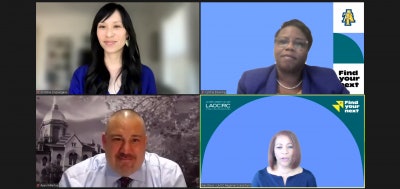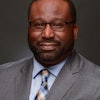Higher ed officials discussed how employers can improve and diversify their student recruiting efforts during a virtual panel hosted on Tuesday by career network Handshake.

“When you do virtual recruiting, you are able to help students that might have neurodiversity, that might have disabilities, that need to try and juggle a very heavy course load or part-time work because that’s how they’re getting through school,” said Christine Cruzvergara, chief education strategy officer at Handshake. “It helps folks that otherwise may be autistic, may be shy, may need different types of preparation, focus on building a relationship with you – showcasing the strengths that they can bring to the table – rather than focusing on how to navigate a loud networking event or career fair and jostling other peers for competition and getting just a little bit of facetime with you.”
Almost half of students Handshake surveyed preferred one-on-one virtual interaction with employers, especially women and underrepresented racial and ethnic respondents, Cruzvergara said.
Dr. Alex Davis, executive director of the Los Angeles Orange County Regional Consortium (LAOCRC) of 28 community colleges, highlighted why employers shouldn’t dismiss community college students as viable recruits.
“And what’s really unique about our community colleges is that we’re flexible,” she said. “We’ve got all ages. We’ve got individuals with grit, with life experiences, with barriers who have navigated themselves around those barriers. And so, for the employers out there, don’t count the community college system out. Our students are brilliant. They’re economically challenged. But they’re brilliant.”
One thing to keep in mind when recruiting at historically Black colleges and universities is student finances, said Cynthia Downing, executive director of career services at North Carolina A&T State University.
“And when you’re also thinking about recruiting at HBCUs, even think about your job announcements,” Downing said. “So, for example, a lot of students at an HBCU may be on financial aid, and when you’re looking at asking them to relocate to California or to New York, where those are expensive areas, the first thing they’re probably thinking is ‘how can I afford this.'”
Offering housing and travel reimbursements “is definitely something that you want to mention in the announcement. Because if not, they may overlook it because they’re thinking, ‘I can’t afford to relocate to that area,'” she added. “And if you’re telling them, ‘We will reimburse you,’ again you want to think about these students are already on financial aid or taking out loans so they don’t necessarily have that money up front.”
A core part of effective recruiting is building relationships, said Ryan Willerton, associate vice president for career and professional development at University of Notre Dame.
“What we’ve also learned particularly over the last six months is that it all comes down to relationships,” Willerton said. “And a relationship can happen virtually just as much as it can happen in person.”
Students surveyed at Notre Dame say that they want in-person recruiting, Willerton said.
“But there’s also a balance with that,” he added, “And there’s a need for virtual engagement, … it’s the entry point for so many students.”
To really diversify its recruiting efforts, employers need to look where they haven’t yet looked, Downing said.
“The next thing I want to encourage you to do is to step outside your comfort zone,” Downing said. “So if you don’t recruit at a community college, consider doing that. If you don’t recruit at a PWI, consider doing that. Or the same with a HBCU. And not only just at different institutions, but in different states as well. Because we know sometimes, because you’re from Michigan or you’re from another area, that’s typically where you remain.
“But if you want to be true in terms of your diversity, equity, inclusion, make sure you step outside your comfort zone.”
Arrman Kyaw can be reached at [email protected]


















